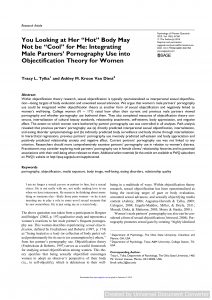Discrimination
You Looking at Her “Hot” Body May Not be “cool” for Me
 Full Article Title: You Looking at Her “Hot” Body May Not be “Cool” for Me: Integrating Male Partners’ Pornography Use into Objectification Theory for Women
Full Article Title: You Looking at Her “Hot” Body May Not be “Cool” for Me: Integrating Male Partners’ Pornography Use into Objectification Theory for Women
Open Access: Yes
Abstract
Within objectification theory research, sexual objectification is typically operationalized as interpersonal sexual objectification—being targets of body evaluation and unwanted sexual advances. We argue that women’s male partners’ pornography use could be integrated within objectification theory as another form of sexual objectification and negatively linked to women’s well-being. College women (N = 171) rated how often their current and previous male partners viewed pornography and whether pornography use bothered them. They also completed measures of objectification theory constructs, internalization of cultural beauty standards, relationship attachment, self-esteem, body appreciation, and negative affect. The extent to which women were bothered by partner pornography use was controlled in all analyses. Path analysis revealed that previous partners’ pornography use (a) directly predicted interpersonal sexual objectification, internalization, and eating disorder symptomatology and (b) indirectly predicted body surveillance and body shame through internalization. In hierarchical regressions, previous partners’ pornography use inversely predicted self-esteem and body appreciation and positively predicted relationship anxiety and negative affect. Current partners’ pornography use was not linked to any criterion. Researchers should more comprehensively examine partners’ pornography use in relation to women’s distress. Practitioners may consider exploring male partners’ pornography use in female clients’ relationship histories and its potential associations with their well-being when relevant to them.
Citation
Tylka, T. L., & Kroon, V. D. A. M. (2015). You looking at her “hot” body may not be “cool” for me: Integrating male partners’ pornography use into objectification theory for women. Psychology of Women Quarterly, 39(1), 67–84. https://doi.org/10.1177/0361684314521784

